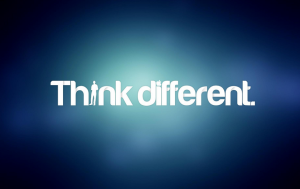 A recent post on the Harvard Business School Blog by Robert D. Austin and Thorkil Sonne argues that seeking out “outlier” employees bring great benefit to companies. I think this is an important perspective. Companies and organizations need creative innovation to address challenging and changing conditions, whatever their service, product or mission. The authors write,
A recent post on the Harvard Business School Blog by Robert D. Austin and Thorkil Sonne argues that seeking out “outlier” employees bring great benefit to companies. I think this is an important perspective. Companies and organizations need creative innovation to address challenging and changing conditions, whatever their service, product or mission. The authors write,
Most companies don’t perceive the value of people who think or behave differently. Managers are unaware that outliers can create enormous value if they’re placed into environments that maximize their ability to contribute. By bringing out the best in people who think differently, you position your company for greater advantage. That’s because innovation, which is a critical skill for businesses today, is driven by diversity of thought. When you can’t foresee the biggest opportunities and problems coming your way, then your people assets must provide your company with the ability to adapt. This ability arises from employees who see things from new perspectives—people from different backgrounds, and those with different cognitive, developmental, and neurological endowments.
They being with an example of a company that hired employees with autism, and why. The full essay follows:
A few months ago, software giant SAP announced plans to hire 650 new employees with autism. Yes, autism—even though people on what’s known as the “autism spectrum” are often seen as unemployable. They typically have trouble interacting with others and tend to engage in repetitive behaviors. Only 15% have full-time jobs.
But this is no charitable gesture on SAP’s part. The company knows that some people with autism have an exceptional ability to focus on the repetitive, detailed work of software testing. The company’s initiative was inspired by the Danish IT firm Specialisterne (“The Specialists”), most of whose staff consultants have some form of diagnosed autism-spectrum disorder. As Torben Sorensen, a former Specialisterne consultant, puts it: “I have an ability to see when something deviates. It kind of leaps to the eye.”
Most companies don’t perceive the value of people with autism—or, for that matter, the value of other people who think or behave differently. Managers are unaware that outliers can create enormous value if they’re placed into environments that maximize their ability to contribute. Consider the dandelion. Many people see this plant only as a weed. But it’s an excellent source of calcium, potassium, iron, and manganese. It’s full of vitamins A, C, E, K, niacin, and riboflavin. The lecithin in its flower can detoxify the liver, and might help combat Alzheimer’s Disease.
In the context of a pristine lawn, it’s a nuisance. Place it in a different context—as a source of nutrition—and the picture changes completely. Context has a similar impact on employees. If you adjust work conditions appropriately, you can activate people’s hidden talents.That might mean, for example, establishing workplace environments that enable individual value creation, or focusing training programs on bringing out and developing exceptional abilities, or establishing performance-management systems that de-emphasize conformity and instead focus on removing obstacles to higher performance.
Specialisterne does all those things. So do Passwerk in Belgium, Auticon in Germany, and Apiritech and Semperical in the U.S., which have followed Specialisterne’s example. These organizations structure their workplaces to maximize workers’ comfort and performance. Sorensen, who studied to be a teacher but acknowledges that he wasn’t good at teaching children or making contact with them, says Specialisterne encouraged him to develop his talents: “In another company I might be expected to make small talk and be flexible. Here I can just concentrate on my work without being considered antisocial.”
By bringing out the best in people who think differently, you position your company for greater advantage. That’s because innovation, which is a critical skill for businesses today, is driven by diversity of thought. When you can’t foresee the biggest opportunities and problems coming your way, then your people assets must provide your company with the ability to adapt. This ability arises from employees who see things from new perspectives—people from different backgrounds, and those with different cognitive, developmental, and neurological endowments.
The tech sector is already moving in this direction. Many managers in tech firms have begun implementing a version of the “dandelion principle” out of necessity. If a very talented worker can’t get the dress code right, has trouble with authority, or can’t seem to arrive at the office until 3 in the afternoon, exceptions are sometimes made. The perspectives provided by these “different people” can be very important to innovation-based businesses.
The dandelion principle applies beyond the high-tech sector. It applies, for example, to how we educate people, and how we make judgments and value tradeoffs in our cultures and societies. The world needs all the talent it can get. Human society can’t afford to set aside people who are different. Their perspectives are desperately needed if we are to innovate our way through today’s global challenges
